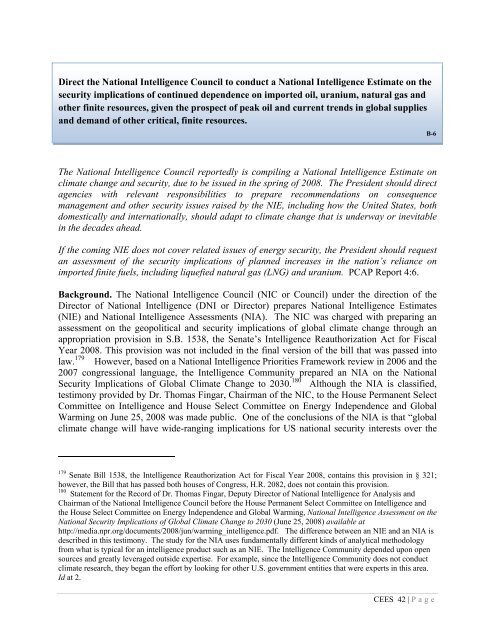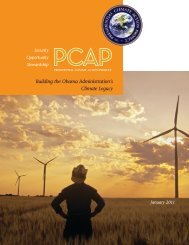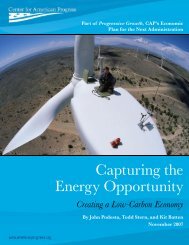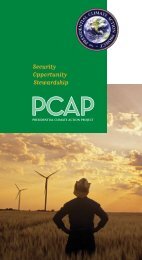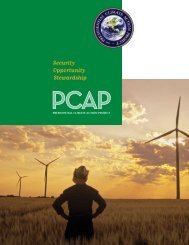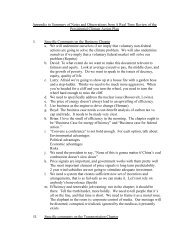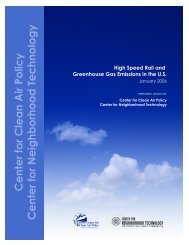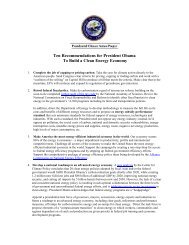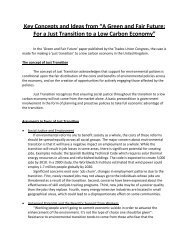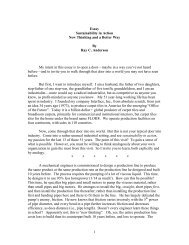PCAP - Presidential Climate Action Project
PCAP - Presidential Climate Action Project
PCAP - Presidential Climate Action Project
- No tags were found...
Create successful ePaper yourself
Turn your PDF publications into a flip-book with our unique Google optimized e-Paper software.
Direct the National Intelligence Council to conduct a National Intelligence Estimate on thesecurity implications of continued dependence on imported oil, uranium, natural gas andother finite resources, given the prospect of peak oil and current trends in global suppliesand demand of other critical, finite resources.B-6The National Intelligence Council reportedly is compiling a National Intelligence Estimate onclimate change and security, due to be issued in the spring of 2008. The President should directagencies with relevant responsibilities to prepare recommendations on consequencemanagement and other security issues raised by the NIE, including how the United States, bothdomestically and internationally, should adapt to climate change that is underway or inevitablein the decades ahead.If the coming NIE does not cover related issues of energy security, the President should requestan assessment of the security implications of planned increases in the nation’s reliance onimported finite fuels, including liquefied natural gas (LNG) and uranium. <strong>PCAP</strong> Report 4:6.Background. The National Intelligence Council (NIC or Council) under the direction of theDirector of National Intelligence (DNI or Director) prepares National Intelligence Estimates(NIE) and National Intelligence Assessments (NIA). The NIC was charged with preparing anassessment on the geopolitical and security implications of global climate change through anappropriation provision in S.B. 1538, the Senate’s Intelligence Reauthorization Act for FiscalYear 2008. This provision was not included in the final version of the bill that was passed intolaw. 179 However, based on a National Intelligence Priorities Framework review in 2006 and the2007 congressional language, the Intelligence Community prepared an NIA on the NationalSecurity Implications of Global <strong>Climate</strong> Change to 2030. 180 Although the NIA is classified,testimony provided by Dr. Thomas Fingar, Chairman of the NIC, to the House Permanent SelectCommittee on Intelligence and House Select Committee on Energy Independence and GlobalWarming on June 25, 2008 was made public. One of the conclusions of the NIA is that “globalclimate change will have wide-ranging implications for US national security interests over the179 Senate Bill 1538, the Intelligence Reauthorization Act for Fiscal Year 2008, contains this provision in § 321;however, the Bill that has passed both houses of Congress, H.R. 2082, does not contain this provision.180 Statement for the Record of Dr. Thomas Fingar, Deputy Director of National Intelligence for Analysis andChairman of the National Intelligence Council before the House Permanent Select Committee on Intelligence andthe House Select Committee on Energy Independence and Global Warming, National Intelligence Assessment on theNational Security Implications of Global <strong>Climate</strong> Change to 2030 (June 25, 2008) available athttp://media.npr.org/documents/2008/jun/warming_intelligence.pdf. The difference between an NIE and an NIA isdescribed in this testimony. The study for the NIA uses fundamentally different kinds of analytical methodologyfrom what is typical for an intelligence product such as an NIE. The Intelligence Community depended upon opensources and greatly leveraged outside expertise. For example, since the Intelligence Community does not conductclimate research, they began the effort by looking for other U.S. government entities that were experts in this area.Id at 2.CEES 42 | P age


